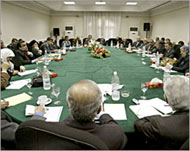UN team picks Iraq poll panel
A United Nations advisory team has selected an eight-member independent electoral commission in the first major step towards national elections in Iraq due by January.

Carina Perelli, UN elections chief, described the commission on Friday as “well-balanced”, despite organisational problems posed by the deteriorating security situation.
The world body said a commission would have to be established and rules promulgated this month if elections are to be held by the end of January as provided for under the US blueprint for handing over power to the Iraqis.
The eight include Abd al-Husayn al-Hindawi, Farid Michael, Hamdi Abbas al-Husayni, Ibrahim Ali Ali, Izz al-Din Muhammad Shafiq, Mustafa Safwat Rashid, Muhammad al-Jaburi and the chairman, Muhammad Allami. None were widely known.
Tasks ahead
The commission will be charged with creating voter rolls, registering voters, setting up nationwide polling places and other infrastructure. They will also be hiring and training election employees – including some 130,000 poll workers, drawing up some political party rules and “educating” Iraqis about the voting.
 |
|
UN electoral experts met with |
Perelli said about 30,000 polling stations were needed in Iraq.
With approximately eight months for the United Nations to organise national and provincial elections by the January deadline, the commission members were chosen from across the country.
However, the surge of violence in Iraq since April made it impossible to screen applicants in some parts of the country such as Falluja, a hotbed of resistance west of Baghdad, and four southern Shia Muslim cities – Kut, Diwaniyah, Karbala and Najaf.
Perelli said the commission will be totally independent, politically and financially, because it would steer the electoral process for a two-year transition.
Women candidates
The UN team decided that a system of proportional representation with the whole country as a single electoral unit would best suit Iraq’s present circumstances.
Anyone may run in the elections after collecting 500 signatures of voters supporting his or her candidacy.
To ensure women make up a quarter of Iraq’s future parliament, parties must include the name of a woman in every third place on the candidate list.
The US-led occupation authority has set aside an estimated $250 to $260 million for the January elections. Iraqis will later have to decide on a presidential or parliamentary system of government.